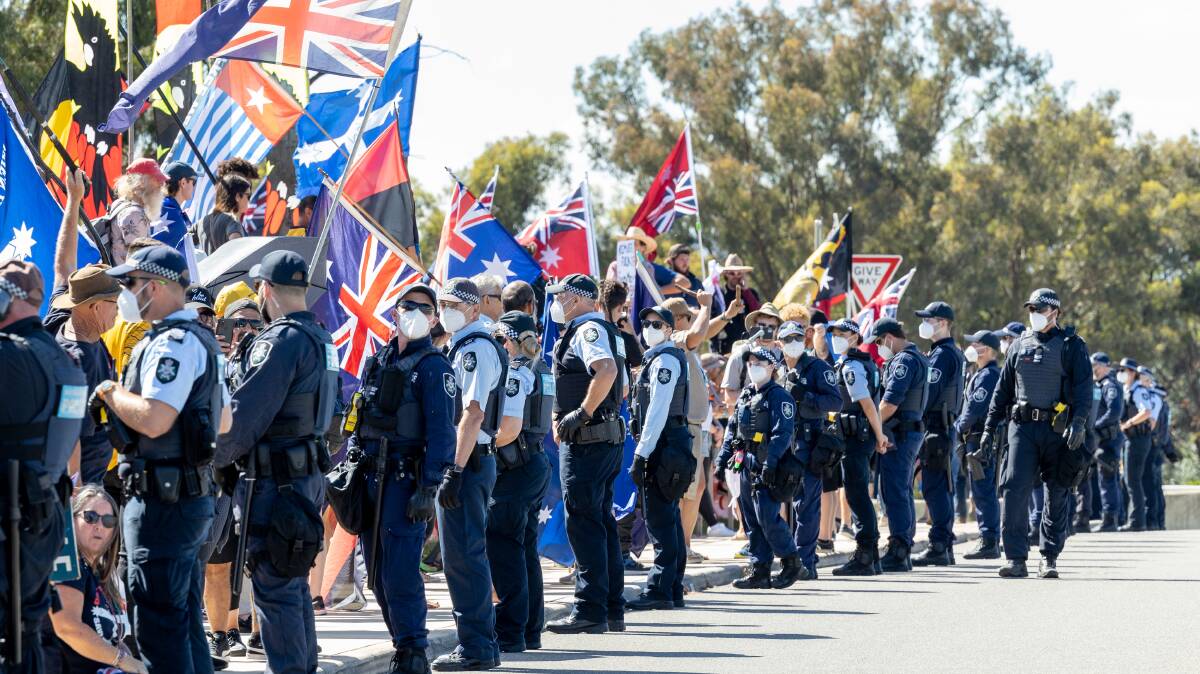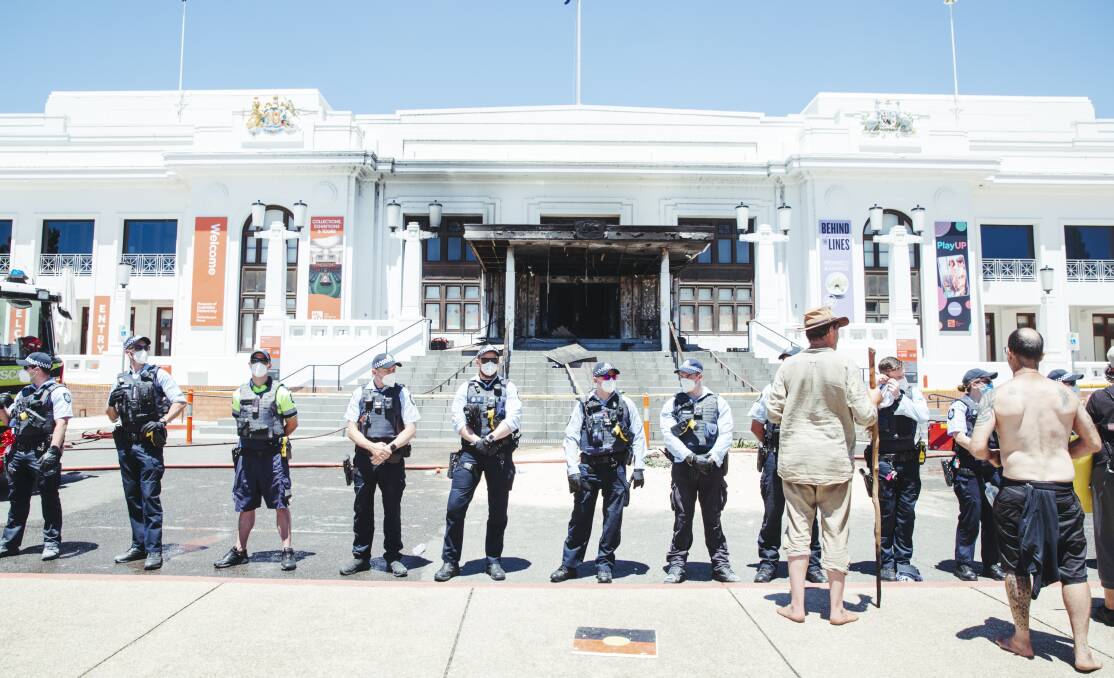The cost for police of managing the rolling series of anti-mandate, anti-vax and "sovereign citizen" protests across the territory has climbed beyond $1.9 million, with this cost almost certain to be charged back to the ACT taxpayer.
Subscribe now for unlimited access.
$0/
(min cost $0)
or signup to continue reading
ACT Chief Police Officer Neil Gaughan has confirmed that 22,000 additional policing hours - a significant proportion of it paid overtime - have been racked up so far to manage the multi-issue "Convoy to Canberra" protests, known internally as Operation Hawker, since late December.
This will be billed as an extraneous "cost recovery". While Police Minister Mick Gentleman will be pressing to push the bill to the Commonwealth, he has failed to receive any meaningful response from his previous approaches to federal Ministers on other protest-related matters.
Deputy Commissioner Gaughan stressed that the $1.9 million sum was only a preliminary figure and the cost was likely to go higher.
"The reason why is that people haven't fully acquitted their hours yet and obviously those that have travelled from interstate haven't acquitted their travel [costs]," he said.
He said that "we basically took people from everywhere [across the Australian Federal Police]" to manage the protest.
ACT Policing is a unique fully contracted police service, with officers trained and drawn from the ranks of the AFP. The ACT government pays around $180 million a year to the AFP to police the territory.
Officers were flown in from as far away as Perth, Brisbane, Melbourne and Sydney, some with less than a day's notice, to support the existing ACT resources.

Plain-clothes detectives who would usually be investigating fraud or property crime out of the various police stations around the territory, or from the main crime area at Winchester Police Centre in Belconnen, were required to change into their uniforms to bolster the general duties numbers.
A number of the police operations, such as the eviction of protesters from their encampment on the Patrick White Lawns in front of the National Library and their eviction from Exhibition Park, required well in excess of 150 uniformed officers, plus additional federal assets such as tactical response and surveillance. Police have been coy on giving the exact numbers involved because of operational sensitivities.
Undisclosed "aerial tactical assets" have also been deployed by police to asset their surveillance at various times but police have flatly denied using any "sonic weapons" or other bizarre devices as claimed by protest organisers and promoted by independent MP Craig Kelly.
The protester numbers reached their zenith in the national capital when a police-estimated crowd of 10,000 people marched on Parliament House on February 12.
A dedicated ACT police intelligence unit, supported by other police jurisdictions, has been over-watching the protest groups since late December, monitoring social media and other communications.
READ MORE:
Most of the protesters have left the territory but around 300 still remain in various public campgrounds and private leasehold properties, some as far away as Braidwood, and have expressed an intention to regroup for further protests in late March to coincide with the Budget sittings of federal parliament.
How many will return to the national capital to bolster the existing cohort is unknown at this time, Deputy Commissioner Gaughan said.
The Australian Federal Police Association said that the response had taken its toll on members in "financial, resource and welfare terms" and "has had an impact on the usual ACT Policing business".
"Outside of the financial cost, there is also a welfare cost to the members. Members have been working long hours and will need to be paid back in terms of standing down from duty and allowed time to take leave and recuperate," association president Alex Caruana said.

"While overtime is nice in the members' pockets, it does come with a physical and mental health cost. My members need time away from the grind of being a police officer. A lot of members have sacrificed their work-life balance over the last month; which is impacting them and their families.
"Before the protest activity, members were already tired and stretch way too thin on the ground."
The ACT government has made it clear that the federal government should be expected to foot part, if not all the police bill for the protest activity.
"The ACT Government worked closely with ACT Policing to keep Canberrans safe and protect federal government property as a result of protest action," an ACT spokesperson said in a statement.
"There is an expectation that the Federal government should meet the additional costs incurred by ACT Policing during this operation, and any future costs associated with protest activity in the nation's capital."
However, the chances of this appear highly unlikely given that Police Minister Mick Gentleman was brushed off by his federal counterparts when he pointed out that "members of the Commonwealth government have encouraged these groups and participated in their activities in the national capital".
Government senators Gerard Rennick and Alex Antic, along with north Queensland MP George Christensen, all publicly backed a national convoy to Canberra in protest against mandatory vaccinations.
The director-general of the Australian Security Intelligence Organisation told the ACT's cabinet that the extremist groups linked to the anti-vaccination mandate protests posed a "substantial threat to national security".
Prime Minister Scott Morrison has said he "understood the concerns of the protesters" but the issue of vaccine mandates was a state responsibility.

